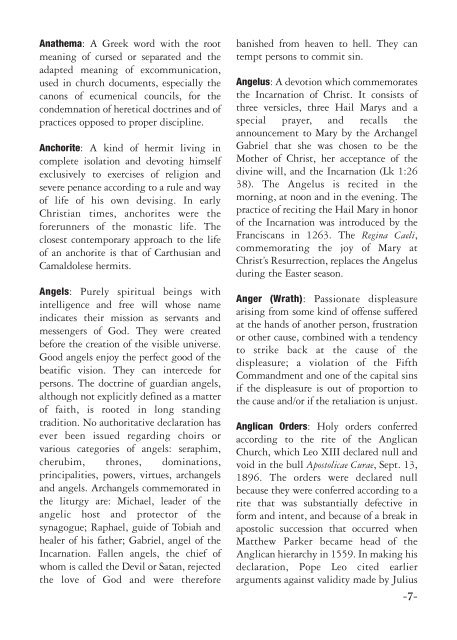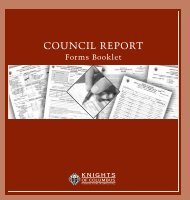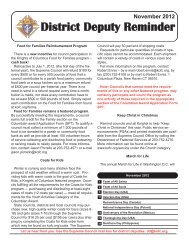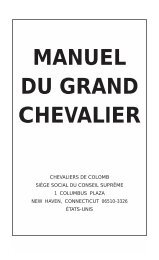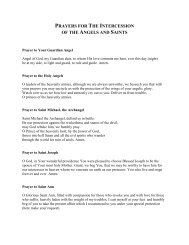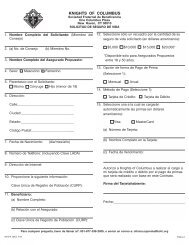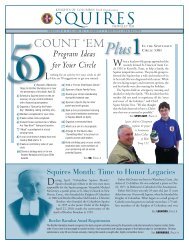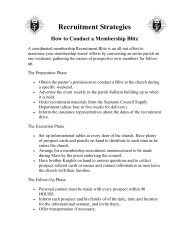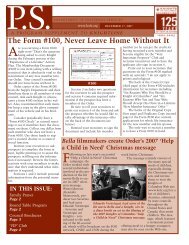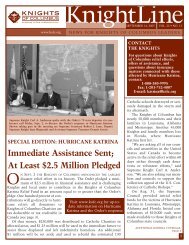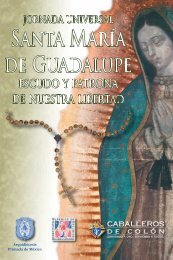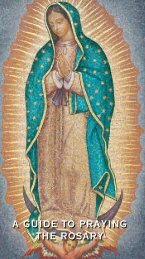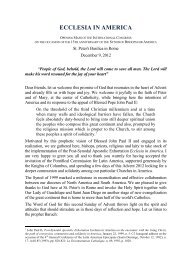CATHOLIC WORD BOOK - Knights of Columbus, Supreme Council
CATHOLIC WORD BOOK - Knights of Columbus, Supreme Council
CATHOLIC WORD BOOK - Knights of Columbus, Supreme Council
Create successful ePaper yourself
Turn your PDF publications into a flip-book with our unique Google optimized e-Paper software.
Anathema: A Greek word with the root<br />
meaning <strong>of</strong> cursed or separated and the<br />
adapted meaning <strong>of</strong> excommunication,<br />
used in church documents, especially the<br />
canons <strong>of</strong> ecumenical councils, for the<br />
condemnation <strong>of</strong> heretical doctrines and <strong>of</strong><br />
practices opposed to proper discipline.<br />
Anchorite: A kind <strong>of</strong> hermit living in<br />
complete isolation and devoting himself<br />
exclusively to exercises <strong>of</strong> religion and<br />
severe penance according to a rule and way<br />
<strong>of</strong> life <strong>of</strong> his own devising. In early<br />
Christian times, anchorites were the<br />
forerunners <strong>of</strong> the monastic life. The<br />
closest contemporary approach to the life<br />
<strong>of</strong> an anchorite is that <strong>of</strong> Carthusian and<br />
Camaldolese hermits.<br />
Angels: Purely spiritual beings with<br />
intelligence and free will whose name<br />
indicates their mission as servants and<br />
messengers <strong>of</strong> God. They were created<br />
before the creation <strong>of</strong> the visible universe.<br />
Good angels enjoy the perfect good <strong>of</strong> the<br />
beatific vision. They can intercede for<br />
persons. The doctrine <strong>of</strong> guardian angels,<br />
although not explicitly defined as a matter<br />
<strong>of</strong> faith, is rooted in long standing<br />
tradition. No authoritative declaration has<br />
ever been issued regarding choirs or<br />
various categories <strong>of</strong> angels: seraphim,<br />
cherubim, thrones, dominations,<br />
principalities, powers, virtues, archangels<br />
and angels. Archangels commemorated in<br />
the liturgy are: Michael, leader <strong>of</strong> the<br />
angelic host and protector <strong>of</strong> the<br />
synagogue; Raphael, guide <strong>of</strong> Tobiah and<br />
healer <strong>of</strong> his father; Gabriel, angel <strong>of</strong> the<br />
Incarnation. Fallen angels, the chief <strong>of</strong><br />
whom is called the Devil or Satan, rejected<br />
the love <strong>of</strong> God and were therefore<br />
banished from heaven to hell. They can<br />
tempt persons to commit sin.<br />
Angelus: A devotion which commemorates<br />
the Incarnation <strong>of</strong> Christ. It consists <strong>of</strong><br />
three versicles, three Hail Marys and a<br />
special prayer, and recalls the<br />
announcement to Mary by the Archangel<br />
Gabriel that she was chosen to be the<br />
Mother <strong>of</strong> Christ, her acceptance <strong>of</strong> the<br />
divine will, and the Incarnation (Lk 1:26<br />
38). The Angelus is recited in the<br />
morning, at noon and in the evening. The<br />
practice <strong>of</strong> reciting the Hail Mary in honor<br />
<strong>of</strong> the Incarnation was introduced by the<br />
Franciscans in 1263. The Regina Caeli,<br />
commemorating the joy <strong>of</strong> Mary at<br />
Christ’s Resurrection, replaces the Angelus<br />
during the Easter season.<br />
Anger (Wrath): Passionate displeasure<br />
arising from some kind <strong>of</strong> <strong>of</strong>fense suffered<br />
at the hands <strong>of</strong> another person, frustration<br />
or other cause, combined with a tendency<br />
to strike back at the cause <strong>of</strong> the<br />
displeasure; a violation <strong>of</strong> the Fifth<br />
Commandment and one <strong>of</strong> the capital sins<br />
if the displeasure is out <strong>of</strong> proportion to<br />
the cause and/or if the retaliation is unjust.<br />
Anglican Orders: Holy orders conferred<br />
according to the rite <strong>of</strong> the Anglican<br />
Church, which Leo XIII declared null and<br />
void in the bull Apostolicae Curae, Sept. 13,<br />
1896. The orders were declared null<br />
because they were conferred according to a<br />
rite that was substantially defective in<br />
form and intent, and because <strong>of</strong> a break in<br />
apostolic succession that occurred when<br />
Matthew Parker became head <strong>of</strong> the<br />
Anglican hierarchy in 1559. In making his<br />
declaration, Pope Leo cited earlier<br />
arguments against validity made by Julius<br />
-7-


